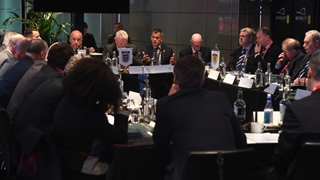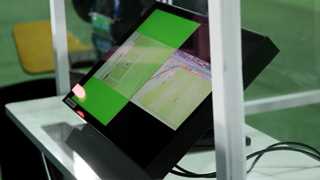
The Football Association intends to introduce Video Assistant Referees from The Emirates FA Cup third round onwards in the 2017-18 season, according to chief executive Martin Glenn.
The use of VARs would apply to four categories of match-changing incidents: awarding goals, penalty or no penalty, direct red cards (not second yellow cards) and cases of mistaken identity.
Glenn, speaking following Friday’s IFAB annual general meeting, confirmed testing the most effective VAR systems and educating those officials that will be asked to implement them was an on-going process.
However, he confirmed we could well see the scheme piloted on these shores from January 2018.
Glenn said: “I would expect to see Video Assistant Referees in the third round of the FA Cup in the coming season, subject to being fully prepared and ready.
“With Video Assistant Referees, FIFA were nervous about it for a number of years, saying we were going to go and do it, but the people at IFAB have done a terrific job in carrying out a huge number of tests.
“So across the world there is real testing going on, either back-room testing where referees are being trained to look at TV screens and being asked to suggest interventions on a theoretical basis to real-life testing at MLS friendlies in Europe.
“The evidence of the testing is really encouraging. We’ve made terrific progress and we think the game will be improved on the back of it.
“We are not going to get every decision right, but we want the minimum intervention for maximum gain.”
FIFA president Gianni Infantino also confirmed VARs would be used in the next staging of the Confederations Cup, the Under-20 World Cup and the Club World Cup in the United Arab Emirates.
In addition, there was unanimous approval for a future IFAB strategy. One of its major initial features focuses on the role of the captain and how their responsibilities could be enhanced to help improve a team’s on-field behaviour and create better communication with referees. Methods to tackle time-wasting will also be considered.
As part of modifications to the laws of the game – to come into effect from 1 June 2017 – proposals to allow temporary dismissals (sin bins) for yellow card offences were approved for youth, grassroots and disability football, as is the case for return substitutions.
The AGM also approved use of electronic communication systems in the technical area for player welfare and safety, acknowledging the importance of technology in assessing potential injuries with the help of medical data and video material.
The success of the change from a red to yellow card for a penalty awarded for the denial of a goal-scoring opportunity if there was an attempt to play the ball, led the members to extend the principle by removing a yellow card for a penalty awarded for ‘stopping a promising attack’ if the offence was an attempt to play the ball.
The order in which kicks are taken in a penalty shootout were also in the agenda.
Under the current system, the team that takes the first penalty in an alternate order wins the shootout 60 per cent of the time.
It has been proposed a new system, similar to the order in which a player serves in a tennis tie-break, could be used, following the pattern ABBAABBAAB.











